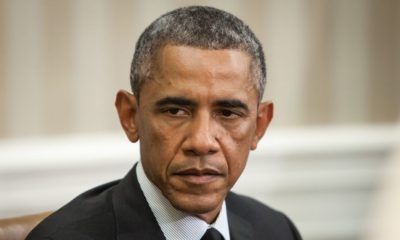Crime
The U.S. Is Waving The White Flag For ISIS
- A Security Forum was held in Aspen and the topic of “defeating” the Islamic State didn't come up.
- The United States government is not treating ISIS like a deadly force that must be defeated.
- They said that a war to defeat ISIS would take years, if not more.
- They are taking steps to slowly get ahead of the terrorist group, but the government is losing hope.
The Islamic State. The word itself gives off a feeling of annoyance and agitation. Why? The United States government is not treating ISIS like a deadly force that must be defeated. They are not seeing the terrorist organization as a global threat that endangers the lives of everyone in the world. They are being treated like that annoying house fly that continues to swirl around your head while you sit at the dinner table.
At the annual gathering of national security chiefs in Aspen, the talk of “defeat” was not on the lips of anyone. The only words said about the terrorist group was a warning of their future attacks.
Representative Adam Schiff (D-CA), who happens to be a ranking member of the House Intelligence Committee said, “Do we expect more attacks? Regrettably, we do, both in Europe and the U.S.”
The European Union Counterterrorist Coordinator Gilles de Kerchove said, “If we destroy [ISIS] in Syria and Iraq so they don’t have a territory anymore, of course, that reduces their influence. But the virtual caliphate has not been destroyed. The capacity to inspire in the west will remain for some time.”
[wps_products_gallery product_id=”4363547410483, 4392315519027, 4344660983859″]
Unfortunately, for President Obama's reputation and for the reputation of America's “never negotiating with terrorists” frame of mind, the government has no hope of defeating the Islamic State. Obama swears that the commitment to defeat the terrorist group has been doubled but by the enthusiasm (or lack thereof) at the Aspen Security Forum, that doesn't seem to be the case.
The talks in Aspen were not of the removal of the problem (ISIS) but the endurance of an annoyance. One plan of action was to drive the terrorist group out of Syria and Iraq. Once taking them out of their “kingdom” they might just wither and die without support. However, others at the forum claimed the group would just move their operations to another location and continue forward.
The NCTC chief Rasmussen said, “Even if they lose territory, it doesn’t mean striking outside their boundaries will be limited. Even with a significantly shrunken and reduced footprint, the ability is still there to carry out operations globally.”
The only thing they could seem to agree on was the fact that terrorism is a symptom. The cause being global instability because of local fights due to lack of resources, which is empowered by a rising bulge in youth. After all, youths are impressionable.
Lisa Monaco, the White House counterterrorism advisor said, “I think people rightly have a sense of unease because it is so unpredictable. I don’t think the type of carnage or depravity, like the type in Nice, we should never consider that normal. If we’ve gotten to that point, I think we’ve lost our way.”
Some at the forum agreed that ISIS has brought forth a “new phase,” in terrorism. In a weird way, the promote creativity. Instead of staying inside the box and only using common methods of destruction, they encourage the use of creativity. “Get a truck, mow down a bunch of people, get a weapon, get a rifle, shoot people. The more brutal, the more mindless the better,” said Jim Clapper the Director of National Intelligence.
Some attending the forum wondered when the senseless attacks would end. Jen Johnson, the Homeland Security Chief said, “I have watched us evolve from terrorist directed attacks from al Qaeda affiliates. The answer there was take the fight to the enemy overseas in places like Yemen and Somalia. Get them before they can get us. Now we see… the rise of the terrorist inspired attack where the operative may not have met, may not have trained with the organization, may not have ever received a direct order but is inspired by internet social media to go carry out an attack. It’s more complicated.”
The government has now partnered up with communities to “see something, say something,” to try and counter the growing number of Islamic radicals.
If this fight is going to be as long and drawn out as the people at the Aspen Security Forum, let's hope that whoever sits in the Oval Office next has what it takes to see it through.












